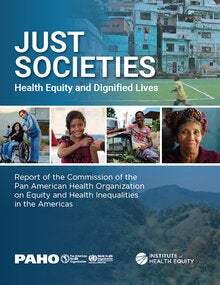In the last decades, health in the Region of the Americas has improved dramatically, yet many people are being left behind. PAHO has established the Commission on Equity and Health Inequalities in the Americas to analyze the impact of drivers influencing health while proposing actions to improve inequalities in health.
According to the evidence presented in this report, much of ill health is socially determined. Factors such as socioeconomic position, ethnicity, gender, sexual orientation, disability status, being a migrant—alone or in combination—can contribute to marked inequalities in health on life. The analysis also reveals that other structural factors, such as climate change, environmental threats, and one’s relationship with the land, as well as the continuing impact of colonialism and racism, are also slowing progress towards a dignified life and enjoying the highest attainable standards of health. Furthermore, the impact of daily life conditions shows that the effect of inequalities is seen at the start of life.
The report provides examples of successful policies, programs, and actions implemented in countries and presents 12 recommendations to achieve health equity, calling for coordinated actions among local and national governments, transnational organizations, and civil society to jointly address the social determinants of health.
|

